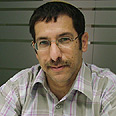
Uri Orbach
צילום: תומר ברזידה
Ignorance is power
Religious intentionally create impression that they are not fully familiar with secular world
My friend Kobi Arieli once told me that while visiting the Biblical Zoo in Jerusalem he encountered an ultra-Orthodox teacher, near the tiger’s cage, telling his students in Yiddish that it was in fact a lion. When Kobi corrected him, the teacher said, in Yiddish: “Lion, tiger, what’s the difference?”
We are told that knowledge is power, yet it appears that often the fear of displaying too much knowledge is one of the characteristics of religious and ultra-Orthodox discourse. Even though there is no mitzvah that prompts us to confuse tigers and lions, religious people nonetheless have a tendency to convey the sense that general knowledge is minor and insignificant vis-à-vis familiarity with the Torah.
One is allowed to know a little bit about the ways of the world, but this isn’t truly important, because “the Torah contains everything.” Therefore, it is even appropriate to display blatant contempt towards everything that represents the achievements of modern society. This is the case in the face of scientific innovation, and certainly in the face of “culture produced by sinners.” Ignorance is power, too.
The more amusing displays of contempt come when a religious or ultra-Orthodox person is forced to address information that is not as innocent as a lion or tiger, but rather, is associated with the blatantly secular world. Here is a sentence that will never appear in an ultra-Orthodox daily: “A movie aired on television featured a female soldier killed by her boyfriend after she was impregnated by a movie star she met in an online chat.” Such report will never appear not only because it deals with crime news, but also because every word in it is unfitting for print in an Orthodox newspaper: Not “movie” and not “aired” and not “female soldier” and not “murdered” and not “boyfriend” and not “impregnated” and not “movie star” and not “chat.”
Deliberate distortion
This is a deliberate disregard technique, which espouses the notion that not all the ugly and foreign things should be in the newspaper, and certainly not a paper whose readers choose to live in a world of Torah and modesty. The question is, of course, what the forbidden words are, what the boundaries are, and whether exaggerated verbal sterility exacts a price elsewhere. On the other hand, when one is exposed to the extreme and crude manner in which the secular and wholly free press reports on sex and violence, one feels like finding refuge in the pages of an Orthodox paper.
In a newspaper that only caters to Orthodox readers, it is possible to ignore what’s happening outside. But what happens when an Orthodox individual converses with others who are less religious, or even secular? On the one hand, such individual wishes to show them that their world is not completely foreign to him and that he is up-to-date. On the other hand, he is certainly interested in not demonstrating too much knowledge, heaven forbid, which is unfitting for a Torah man such as himself.
Therefore, such individual would resort to the technique of deliberate distortion. For example: “I heard that this singer was here recently, what’s his name, John McCartney…” Here, the person he talks to will intervene and correct it forgivingly: “Paul, rabbi, Paul McCartney.” And the rabbi will flash an even bigger smile and reply: “Paul, John, I don’t really know…” and continue talking. This way, he will demonstrate the fact that he is aware of the latest developments, but not completely so, and that he doesn’t really know things he’s not supposed to know.
John or Paul, a lion or a tiger, I don’t really know. If wasn’t so amusing, it would certainly be sad. But come on, what’s the difference.










